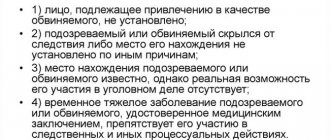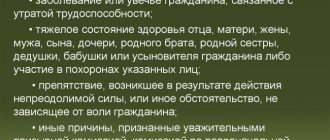The Constitution of the Russian Federation (Part 1, Article 46) declares the right to judicial protection of human rights and freedoms. Every citizen, when facing a criminal charge, has the right to a fair and public hearing within a reasonable time by an independent and impartial tribunal established by law.
Taking into account the requirements of legislative norms and the provisions of the International Covenant on Civil and Political Rights, criminal cases must be considered without undue delay, in strict accordance with the rules of legal proceedings and within specific deadlines.
Filing an application to initiate a criminal case
The period for consideration of a criminal case is regulated by the Criminal Procedure Code of the Russian Federation (hereinafter referred to as the Code of Criminal Procedure of the Russian Federation).
Based on Art. 140 of the Code of Criminal Procedure of the Russian Federation there are four grounds for initiating criminal proceedings and starting prosecution:
- Reporting a crime. Submitted orally or in writing. It is necessary to write down who the applicant is. In Art. 141 of the Code of Criminal Procedure of the Russian Federation states that an anonymous statement cannot serve as a reason to initiate a case.
- Confession. A voluntary statement by a person about the commission of a socially dangerous offense, formalized in the established manner (either a written statement where the applicant is registered, or a protocol drawn up according to the applicant’s words and signed by him personally). Confession is one of the grounds for mitigation of punishment.
- A message about a committed or impending offense that was received from other sources. In this case, a report is drawn up.
- The prosecutor's decision to forward the established facts to the preliminary investigation body . This step is necessary when the issue of persecution arises.
The application procedure is simple:
- You need to give an oral or written statement to the police department, to which you can attach evidence of the crime.
- You will be given a certificate indicating that your application has been accepted.
- Your testimony will be taken. Witnesses can be brought into the case.
- Documents are transferred to the prosecutor or investigator if he has written permission to conduct the case from the prosecutor.
- The prosecutor decides whether to initiate a case or refuse.
During the taking of testimony the following is noted:
- object of crime;
- its danger and illegality;
- method of committing the crime;
- means of assassination of the victim;
- time and place of the crime;
- the identity and age of the accused;
- intent, motive, purpose.
A case will be initiated if the prosecutor identifies signs of a crime from the documents. The reason will also be a formalized confession.
Example of a case involving an extension of deadlines
One of the high-profile court cases considered by judges in criminal trials is the case of citizen Ilya Farber, considered in the Tverskoy District Court on charges of abuse of official power and receiving a sum of money as a bribe.
The essence of the charge, according to investigators, is as follows. Citizen Farber had previously received a bribe in the amount of three hundred thousand rubles from the head of a subcontracting construction organization, then the accused demanded a new amount of one hundred thirty-two thousand rubles.
After the extortion of the second amount, the head of the contract construction company filed a statement with the police department regarding the fact of extortion. Based on the application received, operatives of the Tver branch of the Federal Security Department established surveillance of the defendant, which facilitated the arrest of the citizen upon discovery of the transfer of funds.
After his arrest, Ferber was put in the bullpen for one day. The investigator stated that there are grounds to increase this period to ninety days. The representative of the accused filed a petition to cancel the document giving the right to increase the term, stating that the extension of the period of pre-trial detention is illegal, and the specified reasons for the detention are unfounded.
The court decided to place the defendant in custody.
The lawyer sent his complaint to the appellate authority. The complaint contained arguments that the court incorrectly analyzed the investigator’s position regarding the fact that, while outside the place of detention, the detainee could hide from the investigation, destroy evidence, or threaten the applicant or witnesses. Also, the defendant’s defense stated that the investigator’s decision to extend the defendant’s detention was unconfirmed by the facts, and the conclusions were untenable and not supported by evidence.
The appellate court examined the arguments of both sides, analyzed the content of the complaint and documents in the criminal case and made the following conclusions.
The second part of Article 109 of the Criminal Procedure Code determined the possibility of increasing the period of detention by up to six months in the event that it is not possible to complete the pre-trial investigation within the two-month period established by law. An increase in the term to more than six months can only be applied to persons who have committed crimes of a high degree of gravity and only if the case is highly complex.
Article 110 of the Code establishes the possibility of canceling a preventive measure if the need for it disappears or changing the punishment for a criminal offense towards mitigation.
Documents in the case provided by the investigator to the court indicate that the filing of the petition to increase the time of detention of the accused in the pre-trial detention cell was carried out in full accordance with criminal norms: the subject of the petition was proper and procedurally appropriate; the petition contained in the document was drawn up within the framework of the criminal case under consideration; The court's extension of the terms of arrest at the pre-trial stage was properly formalized, taking into account the provisions of the criminal procedural legislation and fulfilling the requirements contained in Article 162 of the Criminal Code. In addition, the petition drawn up by the investigator was authorized by the higher management of the investigative body, taking into account the provisions of Article 109.
The lawyer's position, set out in the written complaint, has not been confirmed. Documents in the case confirmed that the investigation had sufficient grounds to increase the period of detention of the defendant until the end of all necessary investigative procedures within the framework of criminal proceedings. The defense's arguments that the investigation did not have evidence on the basis of which it concluded that the defendant could hide from the police or the court, influence the testimony in any way, threaten the plaintiff, neutralize evidence confirming guilt, or continue to engage in illegal activities , turned out to be unconfirmed.
The court, for its part, examined the documents provided by the investigator and came to the legitimate conclusion that the defendant citizen, while staying outside the place of forced confinement, can carry out the following illegal actions:
- Hide from the police or court.
- Influence testimony.
- Neutralize evidence supporting guilt, including that which has not yet been found.
- Another way to interfere with judicial proceedings.
This information allowed the court to render a verdict on the need to approve the petition to increase the defendant’s period of detention.
Information about the identity of the citizen, which his lawyer demanded to include as an indisputable and sufficient reason to change the preventive measure for the defendant, also, according to the court, was not confirmed. The court pointed out that the application of the above measure was lawful, since the grounds for its application were not abolished by law and did not become more lenient.
The court, having studied the materials that the police officer handed over to him, authorized the issuance of a longer period of detention. According to the Criminal Code, the panel of judges did not identify any violations in the field of procedural order during the criminal prosecution and detention of the defendant. The investigator brought charges against the detainee in compliance with all procedural norms. None of the authorities identified any violations in the actions of the police department employees.
The court determined the validity and procedural correctness of the use of a preventive measure in the form of detention in a cell until the completion of pre-trial proceedings. When considering the petition and the criminal case itself in the trial, the court granted the parties equal rights to protect and implement the principle of adversarial law. The evidence that the parties provided to the court was carefully studied and properly recorded.
The appellate instance of the court did not find a single violation of the conduct of the trial in the procedural sense, which the court could use as a reason to cancel the investigator’s decision to increase the period of the defendant’s arrest.
Based on all the facts and conclusions, the appellate court decided that the decision made by the Tverskoy District Court to increase the period of detention of the accused under arrest should not be canceled, and the complaint of the representative of the defendant Farber should not be satisfied.
The defendant's representative did not forward the complaint to higher authorities.
Time limits for considering a crime complaint
The application must be reviewed within three days. During this same time, the prosecutor is obliged to make a decision whether to initiate a criminal case or refuse to do so.
According to Article 24 of the Code of Criminal Procedure of the Russian Federation, there are the following grounds for refusal:
- The facts prove that there was no crime.
- There is no evidence that indicates the possibility of committing a crime.
- The statute of limitations under Article 78 of the Criminal Code of the Russian Federation was not met.
- Death of the accused.
- Refusal of the victim to submit an application or its withdrawal.
- Insufficient age of the accused for criminal liability.
- The act is not criminal in nature, but, for example, administrative, civil.
The period for consideration of the application may be extended by 10-30 days. Reasons – the need to:
- forensics;
- checking the authenticity of documents;
- checking murder weapons and other items;
- examination of the corpse.
If more than a month has passed since the beginning of consideration of the application in a criminal case, it is necessary to contact the authorities that exercise control over the actions of law enforcement agencies.
Start of a criminal case
After completing the application process, an investigation begins, following which a decision must be made. As already mentioned, the investigation period is two months from the moment the case was opened.
The investigation process is long and difficult. Evidence is being prepared, witnesses are being questioned, crime scenes are being examined, examinations are being carried out, etc. The period of preliminary investigation may drag on for an indefinite period. But there are some limits.
Length of investigation
The main period for consideration of a criminal case by an investigator is two months, but it can be extended to three if such a decision was made by a higher-ranking official of the investigative body. The period may increase to 12 months if certain difficulties arise during the investigation process.
Important! The Investigative Committee of the Russian Federation is responsible for the timing of the extension of the criminal case.
The length of the preliminary investigation period is determined by the severity and complexity of the crime, its scale and the number of persons involved.
The duration of the investigation increases if more time is needed for the investigation, but this does not require significant requirements.
From this we can conclude that there is no maximum duration of investigation in a criminal case, since according to the law the period can be increased without any restrictions. This requires only decisions by high-ranking officials at various levels.
Time limit for reviewing the case for the parties to the process
According to the law, the parties to the process are given no more than five days to familiarize themselves. After this, a written protocol is drawn up, in which you can express your disagreements or share your opinion on controversial issues.
If at the familiarization stage the accused does not have a defense attorney, he is provided with a public defender who will handle his case. If the presence of a defense lawyer is not necessary, the accused can familiarize himself with the documents in the case.
If the accused person deliberately refuses to familiarize himself (failure to appear), then the indictment is automatically sent to the prosecutor for making a legal decision.
In this process, the accused is presented with physical evidence or the necessary record. Various materials can also be presented - for example, photographs, video or audio recordings, etc.
What does the Criminal Code of the Russian Federation say about the timing of the preliminary investigation?
The timely completion of the pre-trial investigation without violating deadlines helps to reveal the circumstances of the committed criminal offense in the shortest possible time, as well as to identify, record and use the evidence found during checks and searches in order to create a solid evidentiary basis for the consideration of the case in court, to ensure that the parties are given the opportunity and other persons in the process to accept the necessary assistance.
As a general rule, the duration of the pre-trial investigation and other time intervals are calculated in months, so this period ends on the day when the specified month ends. If a period of time ends on a weekend or falls on a holiday, the last day of the period is moved to the next non-working day.
Art. 162 of the Code of Criminal Procedure of the Russian Federation in its current version considers when the terms of the pre-trial investigation begin to be calculated and what is their maximum duration for any crimes (for example, in cases of robbery, fraud, etc.).
According to part one of the article under consideration, a pre-trial investigation into a case of a criminal offense must be carried out and completed by the officer in charge of the case within a maximum of two months from the date of initiation of the case regarding the crime committed.
The period of two months for carrying out pre-trial investigations in cases of criminal offenses is not final, although it is legislated that the case officer must implement all actions and procedures that depend on him so as not to violate this period. The investigator is also obliged to take advantage of emerging opportunities to more quickly conduct a pre-trial investigation.
The investigation period includes the time from the date when the case was initiated until the moment when the case officer issued a conclusion with the charges brought and sent to the prosecutor.
If necessary, the indictment is replaced by a court order to consider the possibility of applying compulsory medical measures to the detainee. If the case is terminated without bringing charges, the period is considered completed on the day the relevant decision is made.
The following time is not included in the two-month period:
- When an authorized person appeals the prosecutor's return of the case for other procedural actions.
- When an authorized person appeals the prosecutor's return of the case for review of the indictments.
- When an authorized person appeals the prosecutor's return of the case to reclassify the criminal actions of the accused.
- When the prosecutor decides to return the case to the investigator to eliminate the shortcomings identified by a superior person in the indictment issued by the authorized person.
- Time of suspension of the pre-trial investigation on the grounds specified by the Code.
The presence of grounds is mandatory for their exclusion from the general period of pre-trial investigation.
If within a two-month period the investigative actions carried out did not produce any results or no suspects were found within two months, the case is suspended and continues to be considered if new data appears.
Appealing a decision in criminal cases
If the participants in the process are dissatisfied with the court's decision, they can appeal it. This can be done by both the victim and the defendant through their representatives. The periods for this are:
- up to 15 days (for district court);
- up to 30 days (for the regional or supreme court of the republic);
- up to 45 days (for the Supreme Court of the Russian Federation).
If the convicted person is in a pre-trial detention center, he can appeal the verdict after he receives a copy of it - the period will be counted from the moment of receipt.
Procedure for appealing a decision:
- Drawing up an appeal.
- This document must be sent to the higher court through the body in which the decision was made.
- The participant in the process who filed the appeal receives notification of the transfer of the document to higher authorities.
- If approved, preparation for a new process.
Procedure for extending deadlines
An increase in the terms of the pre-trial investigation is adopted by the investigator or inquiry officer issuing a resolution submitted to the head of the investigative body within five days before the expiration of the final terms of the investigation.
If deadlines are extended, the case officer must notify the following persons in writing:
- victim;
- representative of the victim;
- the accused;
- defense attorney for the accused.
The Constitutional Court of the Russian Federation has established that the investigator must notify the victim and his representative (if any), the accused and his defense attorney about the issuance of a resolution to extend the terms in such forms and methods that exclude the possibility of divulging the secrets of the investigation.
Violation of all deadlines and filing a complaint
If any time frames in the conduct of a criminal case are violated, it becomes necessary to file a complaint with higher authorities and the prosecutor's office.
If a real violation of deadlines in criminal cases is revealed, the supervisory authority does everything possible to provide the citizen with the necessary funds. Those who violate the accepted periods are subject to disciplinary action. Reprimands, reprimands, and possibly even dismissal may be issued.
Reasonable term for a criminal case
In Art. 6.1 of the Code of Criminal Procedure of the Russian Federation states that the period for consideration of a criminal case in court, as well as pre-trial proceedings, must be reasonable.
When determining the timing, the following nuances are taken into account:
- the factual and legal complexity of the case;
- actions of participants;
- the adequacy and productivity of the work of the court, the prosecutor, the head of the investigative body, the investigator and other persons, carried out within the prescribed period for the implementation of criminal prosecution or consideration of a criminal case;
- total duration of criminal proceedings.
In case of violation of reasonable deadlines for criminal proceedings during pre-trial proceedings in a criminal case, participants in criminal proceedings and other persons associated with the process may contact the prosecutor or the head of the investigative body with a complaint, which must be considered, in accordance with Art. 124 of the Code of Criminal Procedure of the Russian Federation, within three days. If it is necessary to request additional facts or take other measures - 10 days.
According to Part 1 of Art. 125 of the Code of Criminal Procedure of the Russian Federation, the inaction of the inquirer, investigator, head of the investigative body and the prosecutor, which can cause damage to the constitutional rights and freedoms of participants in criminal proceedings or impede citizens' access to justice, can be appealed in the district court at the place where the offense was committed.
This is interesting:
Criminal liability under Article 199.1 of the Criminal Code of the Russian Federation for failure to fulfill the duties of a tax agent.
Responsibility for inappropriate spending of budget funds under Article 285.1 of the Criminal Code of the Russian Federation.
Time frame for procedural measures
The period designated for carrying out the preliminary investigation can be a maximum of 2 months, which is clearly stipulated by part 1 of Article 162 of the Code of Criminal Procedure.
The two-month period is counted from the date of opening of the relevant criminal case. Thus, the starting point of this interval is considered to be the day the specific case was initiated. This period ends with the date of transfer of the relevant case to the prosecutor or the date the investigator issues a resolution ordering the termination of proceedings in this case.
By transferring the materials of a particular case to the prosecutor, the investigator supplements them with an appropriate indictment. It is noteworthy that this may not be a conclusion, but a resolution ordering the case to be transferred to a judicial authority in order to resolve the issue of forcibly sending the accused to a medical institution.
The period required for the preliminary investigation procedure does not include the following intervals:
- The time used by the investigator to appeal decisions made by the prosecutor. We are talking about a prosecutor's verdict ordering the case to be returned to the investigator for revision on the grounds of paragraph 2 of part 1 of Article 221 of the Code of Criminal Procedure.
- The time during which this investigation was not actually carried out due to its suspension on the grounds specified in part 1 of Article 208 of the Code of Criminal Procedure.
Extending the term
The two-month period specified in part 1 of Article 162 of the Code of Criminal Procedure can be legally increased to 3 (three) months. Such extension of the period falls within the competence of the person in charge of the appropriate investigative body, as provided for in Part 4 of Article 162 of the Code of Criminal Procedure.
Another possible reason for extending the period under consideration is the particular complexity of the case under investigation. For this reason, the investigation period can be extended to 12 (twelve) months. Making such decisions is the competence of the person in charge of the investigative body at the level of a specific region (subject of the Russian Federation). Another option is that such a verdict can be made by the deputy of such a manager. A further increase in this period falls within the powers of the Chairman of the RF IC or his deputies (obviously, this option is being considered for special cases).
If the period for carrying out pre-trial investigative measures needs to be extended, the authorized investigator draws up an appropriate resolution and then submits it to the head of the investigative service 5 days before the end of the current period.
The representative of the investigative body must notify the accused and other interested parties in writing about the fact of such an extension. Such rules are stipulated by parts 7-8 of Article 162 of the Code of Criminal Procedure.









